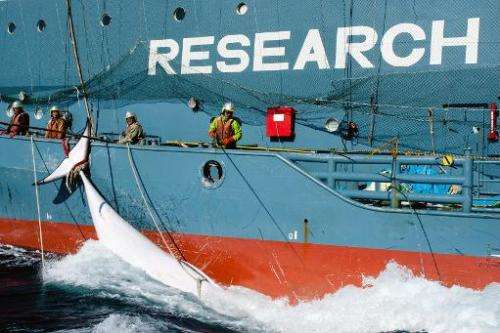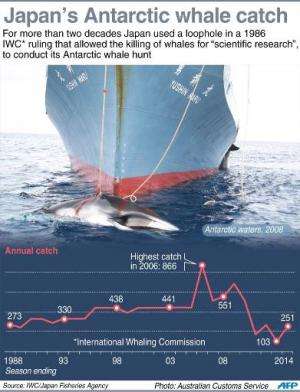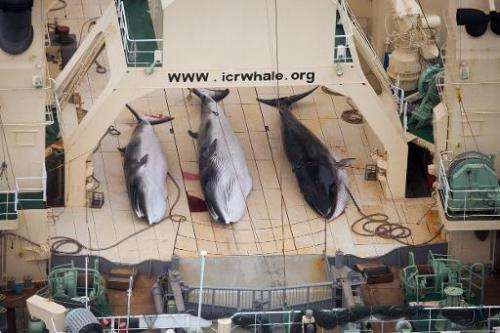Japan to continue scientific whaling in Pacific: reports

Japan has decided to continue its whaling programme in the Pacific Ocean, reports said Friday, despite losing a United Nations court case on its other "research" hunt in the Antarctic.
If confirmed, the move will likely spark anger among environmentalists who hailed last month's ruling by the UN's International Court of Justice (ICJ) that Tokyo's hunt in the Southern Ocean was a commercial activity disguised as science.
Japan has exploited a loophole in a 1986 moratorium that allowed it to conduct lethal research on the mammals, but has openly admitted that their meat makes its way onto dinner tables.
Campaigners urged Tokyo to follow the spirit of the ruling, and not just its letter—which specifically referred to Japan's hunt in the Antarctic, not its other research scheme in the northwest Pacific or its smaller coastal programme.
But in the wake of the ICJ verdict, a government review has said the Pacific hunt should press ahead, public broadcaster NHK and Kyodo News Agency reported.
The review suggests the Pacific mission should reduce its catch and focus more on carrying out research that does not involve catching whales.
A spokesman for the fisheries agency said he was unable to comment.
A company engaged in traditional coastal whaling in northern Japan, and which also takes part in the research hunt, welcomed the news.

"If the research programme is discontinued, our company will no doubt go bankrupt this year," Minoru Ito, president of Ayukawa Hogei Co. in the tsunami-hit city of Ishinomaki, told AFP by telephone.
The company has been catching Baird's beaked whales, a species not covered by the moratorium, in coastal waters since the ban was imposed—a move that threatened to choke the port of Ayukawa which has depended on whaling since the mid-19th century.
It has also taken part in the research programme to hunt Minke whale.
"We can survive if the programme continues while we are recovering from the (2011 tsunami) disaster with borrowed money and government help," Ito said.
Hunt delayed 'for Obama visit'
The reports came a day after Tokyo said the start of the next Pacific hunt had been delayed from April 22 to 26, amid media speculation the postponement was to avoid a clash with a visit by US President Barack Obama.
The mass-selling Yomiuri Shimbun said the delay appeared to be an effort to avoid overshadowing the visit with an activity widely denigrated in the West.

The United States is a major voice in the International Whaling Commission (IWC) against hunting, but is also Tokyo's chief ally in the global community.
A fisheries agency official confirmed Thursday that the fleet would set sail on April 26, a day after Obama leaves Japan.
The hunt in the northwestern Pacific operates two excursions a year, in coastal waters and offshore, from early summer through autumn.
Tokyo this month said it was calling off the 2014-15 hunt in the Southern Ocean, but insisted it had made no decision on whether to resume the Antarctic whaling later—perhaps with a redesigned research programme.
Japan killed 251 minke whales during the last Antarctic hunt, according to government figures released last week, while last year's operation in the Pacific netted 58 minke whales in coastal waters and 132 mammals—including minke, sei and sperm whales—offshore.
© 2014 AFP




















